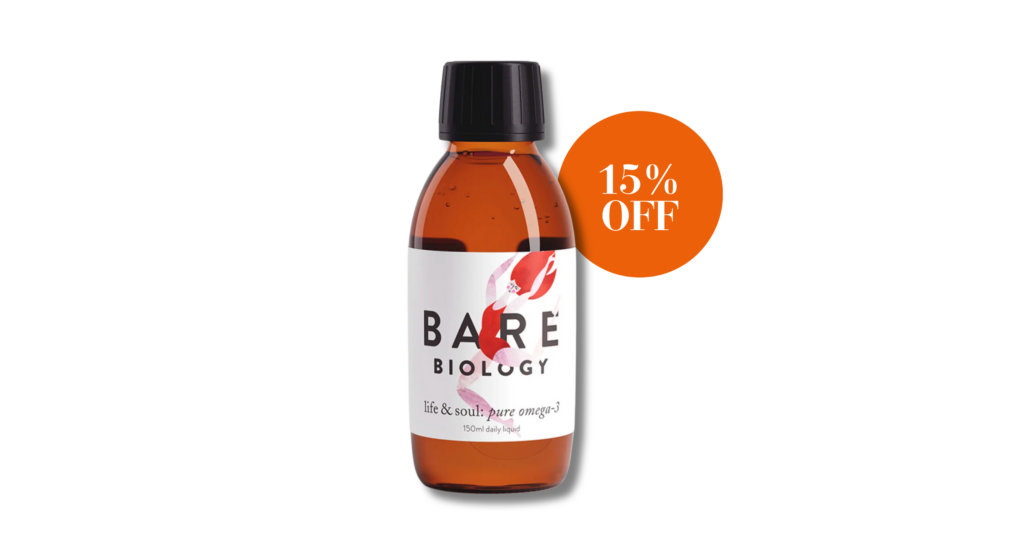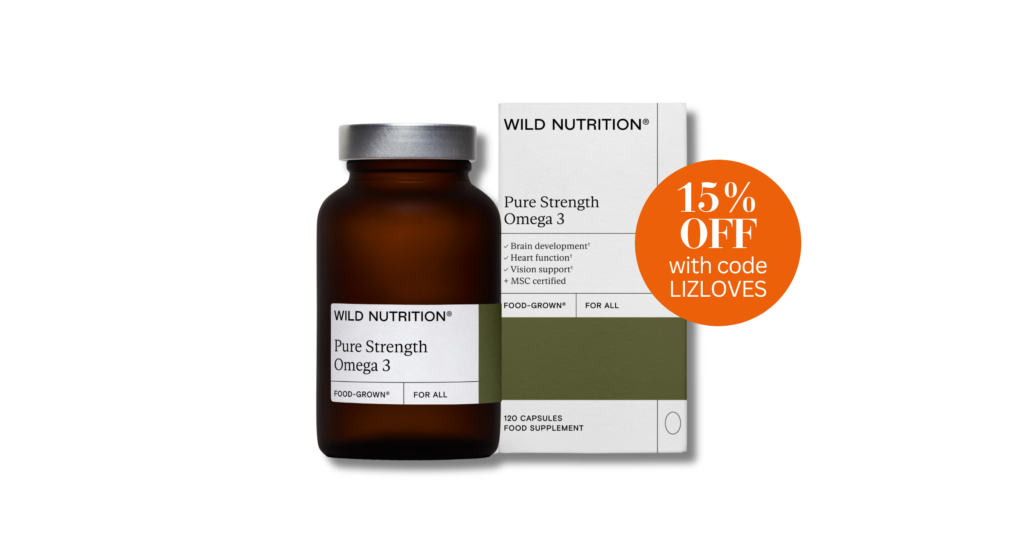The benefits of omega-3 fatty acids for women during menopause

As we enter midlife, looking for ways to support healthy ageing becomes increasingly important. Omega-3 fatty acids can serve as a powerful ally at this time. These essential nutrients are particularly beneficial for supporting heart health, maintaining cognitive function, boosting mood and promoting healthy joints.
What are omega-3 fatty acids?
Omega-3 fatty acids are essential polyunsaturated fats, and these include seafood-based eicosapentaenoic acid (EPA) and docosahexaenoic acid (DHA), plus plant derived alpha-linolenic acid (ALA).
“ALA is an essential dietary fat, but our body can’t make it on its own,” says Dr Simon Dyall, nutritional neuroscientist at the University of Roehampton. “ALA is found in nuts and seeds. Our body can turn ALA into EPA and DHA, but it doesn’t do this very efficiently.
“EPA and DHA are mainly found in oily fish. Most of the beneficial effects of omega-3s have been ascribed to EPA and DHA, because they operate via multiple different mechanisms, one of which is their anti-inflammatory properties – so a higher intake of these can offer a range of health benefits.”
How can omega-3 support health during menopause?
The hormonal changes that occur during menopause, particularly the decline in oestrogen, can lead to several health challenges such as joint aches, heart disease, low mood, declining memory and dry skin.
“Menopause is a time when women undergo general inflammation throughout the whole body,” explains Dr Anne Henderson, consultant gynaecologist and British Menopause Society advanced specialist.
“Omega-3 fatty acids have a beneficial impact on targeting inflammation, as they can suppress the production of generalised inflammatory proteins. Increasing your intake of omega-3 rich foods can be particularly beneficial for alleviating symptoms like joint pain, cardiovascular issues, sleep problems and skin dryness, all of which are common during midlife and menopause,” she adds.
Bone and joint health
During midlife and menopause, our bones undergo significant changes due to a decline in oestrogen levels. “Oestrogen is crucial for maintaining bone density as it regulates the balance between bone resorption and bone formation,” says professor Paul Lee, consultant orthopaedic surgeon and author of Regeneration by Design.
“EPA and DHA, found in fish oil, play a vital role in supporting bone and joint health as they have powerful anti-inflammatory properties that reduce chronic inflammation associated with osteoporosis and arthritis. This helps slow bone resorption and promotes bone formation, supporting overall bone density.
“Omega-3s also benefit cartilage and tendons by enhancing collagen production, which is crucial for joint flexibility.”
Cognitive function and mood
Research shows that 60% of midlife women report difficulty concentrating and other issues with cognition. Whether you’re experiencing brain fog, fluctuating moods or feeling forgetful – hormonal changes are probably to blame.
“The long-chain omega-3s such as EPA and DHA are precursors to a variety of potent bioactive molecules with anti-inflammatory properties, which have been shown to have positive effects in the brain by improving mental clarity and mood,” says Dr Dyall.
“EPA in particular is beneficial on stress and depression in middle-aged women, potentially due to their anti-inflammatory and pro-resolving effects. There is some evidence to show that omega-3s may alleviate night sweats.”
Heart health
Oestrogen has a protective effect on the heart – it helps to control cholesterol and reduces the risk of fat building up in the arteries, while also keeping the blood vessels healthy. A decline in this hormone during perimenopause and menopause can lead to fat building up in the arteries, causing them to become narrower. This increases the risk of developing coronary heart disease, heart attack and stroke.
Menopause can also cause changes in the body such as weight gain and elevated blood pressure, which can raise the risk of coronary heart disease.
“EPA and DHA can be beneficial to heart health,” says Dr Bill Harris, a leading expert in the field of omega-3 fatty acid research.
“They can help lower triglycerides, which are a type of fat in the blood that cause hardening of the arteries. High levels of triglycerides are linked to a greater risk of heart attack. They can also improve circulation, prevent blood clots, reduce blood pressure and maintain a healthy heart rhythm.”
How much omega-3 do we need?
The NHS recommends eating two portions of fish per week, with at least one of these being oily fish.
“A portion is typically defined as 140 grams of cooked fish,” says nutritionist Tina Lond-Caulk. “Oily fish like salmon, mackerel, sardines and trout are excellent sources of EPA and DHA. Eat at least two servings per week – this equates to about 250-500 mg of EPA and DHA per day.
“If you don’t eat fish, try plant-based sources like flaxseeds, chia seeds, and walnuts – these contain ALA, which the body can convert into EPA and DHA. This conversion isn’t very efficient, so incorporating a supplement can help meet your nutritional needs.”
Should we be taking an omega-3 supplement?
While supplementation can be beneficial, experts recommend a food first approach. “Prioritise dietary sources like oily fish whenever possible, as they contain other nutrients in addition to omega-3 – then think about supplementation,” advises Dr Dyall.
The only way to know if your fish oil intake is adequate is to test your omega-3 index.
Try the Omega 3 Index Test Kit – a finger-prick blood test that measures the amount of EPA and DHA in your body.
How to choose an omega-3 supplement
If you choose to take a supplement, check the label for adequate amounts of EPA and DHA.
“Pick supplements that provide 500-1000 mg of combined EPA and DHA per day, which is roughly equivalent to the intake from one to two portions of oily fish per week,” explains Tina.
“For mood, it may be best to take a supplement with higher EPA than DHA doses,” adds Dr Dyall.
There are various forms of omega-3 supplements including triglycerides from fish, ethyl esters (a processed form), and phospholipids found in krill and some algal oils.
“Triglyceride and phospholipid forms are generally better absorbed by the body than ethyl ester forms, making them more effective,” says Tina.
Also, remember that not all fish are equal. “Sustainable choices include smaller fish species like sardines, anchovies and mackerel – they are lower on the food chain, reproduce quickly and they accumulate fewer toxins – making them a healthier choice,” Tina adds.
To ensure freshness, check the expiration date and go for supplements stored in dark bottles, which protect against light-induced oxidation.
“Be sure that they are free from harmful levels of mercury, lead and carcinogenic PCBs. Also, pick products that have been independently tested and certified by third-party organisations like the International Fish Oil Standards (IFOS) or NSF International,” Tina says.
What are the best plant-based omega-3 options?
Algae-derived omega-3s provide a suitable alternative for vegetarians, vegans, and those with fish allergies. “Nutritionally, algae are the original source of DHA and EPA in the marine food chain, as fish obtain their omega-3 content by consuming algae,” explains Tina.
“These supplements are entirely plant-based and are also a good option for those concerned with animal welfare.”
Are there any potential risks associated with taking omega-3 supplements?
“Omega-3 fatty acids supplements, especially at high doses, can have anticoagulant effects, which might increase the risk of bleeding for people on blood-thinning medications such as warfarin or aspirin,” warns Tina. “Some may experience gastrointestinal disturbances like nausea, indigestion or bloating.”
Consult with a healthcare provider who can tailor supplementation to your needs.
The best omega-3 supplements for midlife women:
Bare Biology Pure Omega-3 Liquid
With 2,000mg of EPA and 1,000mg of DHA per teaspoon, this high quality fish oil contains over 10 times more omega-3 per teaspoon than well known high-street brands. Follow this link for 15% off.
Wild Nutrition Food-Grown® Pure Strength Omega 3
This sustainable formula is made from MSC-certified Alaskan Pollock. Take four easily absorbed soft gel capsules a day for 800mg EPA and 400mg DHA. Use code LIZLOVES for 15% off.
Read more features like this
- 5 ways to slow the signs of ageing and support longevity
- Always forgetting your vitamin D supplement? Try this easy hack
Please note, on some occasions, we earn revenue if you click the links and buy the products, but we never allow this to bias our coverage and always honestly review. For more information please read our Affiliate Policy.






